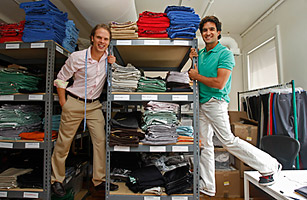
Bonobos trousers chairman and co-founder Brian Spaly, left, and CEO and co-founder Andy Dunn at their company's headquarters in New York.
(2 of 2)
Keeping up with the customer isn't artifice, but essential. Dunn is obsessed with knowing his customer — 32 years old on average, maybe married (half are), and favorite movies include The Godfather, Caddyshack and Shawshank Redemption — information that helps Bonobos reach its target audience the right way. In an industry that has historically spent 5 to 10% of its total sales on print advertising, Bonobos effectively relies mostly on word-of-mouth. Hooper has referred seven people, including one friend who now has 12 pairs of Bonobos slacks. A program that gives $30 off the first purchase for a referred customers and a $50 credit for the person who makes the referral makes the deal sweeter. Several other online retailers including Gilt Groupe, Rue La La, and Hautelook drive traffic with $10-$25 credits for referrals, but Dunn points out, "bigger discount, bigger bounty." It works: referrals account for 50% of its new customers.
Bonobos fans are involved in much more than customer acquisition, though. Their feedback also guides new product ideas. After last year's successful launch of polo shirts — it sold $1,000 of them a day for its first 100 days — Bonobos is expanding with dress shirts in a quest to end the "billowing muffin top" (excess fabric at the waist). They have been using social media tools to enlist customer feedback on some design elements, such as whether the shirts will have one button or two on the cuffs. "Asking the customer? That's revolutionary," says Candace Corlett, president WSL Strategic Retail in NY. "The world of the fashion designer is that the designer knows best. But the stuff that gets left over in stores shows that they miss the mark often."
Customers in the "beta program" — the 900 customers who signed up to test new products and give feedback — are eagerly awaiting the new shirts and are also excited about Bonobos blazers. (The one Dunn is wearing has a red and black tiger stripe on the inside). There's also the possibility of tuxes, which are currently only available for grooms. But Dunn isn't eager to do everything himself. "We have no need to be an uber-brand; category leadership comes down to focus," he says. "Besides, it's un-cool to do everything." This is the theory behind Backed By Bonobos, which sells accessories such as bags, belts, ties, and shoes by independent designers. The first to launch was Ernest Alexander messenger bags, which immediately sold out on the site. "We want to be Barneys of the future. We want to play a role in launching other brands," says Dunn. (Bonobos gets bonus points for actually inspiring this one: Founder Ernest Sabine previously interned at Bonobos while getting his MBA.)
Bonobos has come a long way from selling the 400 pairs of pants Dunn moved to New York with, but it has also experienced its share of growing pains. A foray into swimsuits was a flop (elastic that doesn't squeeze at the love handles has since rectified that problem.) There have been quality issues, including one instance when a style of pants was made with the wrong side of the fabric. Another time the company incensed PETA activists with a YouTube video that depicted a chimpanzee trying on a Bonobos swimsuit. Dunn's good at admitting his mistakes: he removed the video (even though it was on its way to becoming a viral hit), and earnestly says he's now committed to getting legislation passed that would make chimp acting illegal. (The company already supports its namesake by giving $1 for every new customer and $5 on certain products to an ape sanctuary in the Congo.)
Perhaps the most significant challenge though, has been how to cope with what Bonobos wants to be when it grows up. Spaly was bent on continuing as a rogue operation while Dunn, with his penchant for raising money and recruiting pros wanted to grow it with the blessing of industry vets. The difference ended with Spaly leaving in October, but the founders have remained friends. Spaly's position as one of the company's biggest shareholders isn't the only demonstration of his continued belief in Dunn and the new model. He's been recruited as CEO of Trunk Club, a web-based shopping service also centered on the idea that men hate shopping. And, can you guess the most requested brand by Trunk Club's 1,000 members? Get ready to see a lot of pink pants.